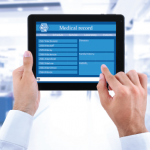The current health system places increasing pressure on physicians and their practices to find new and innovative ways to maximize reimbursement through the implementation of programs and workflows that ensure the delivery of higher quality care—all while the ever-increasing needs of the patient population are placing a greater demand on physician time.
Although these pressures can be frustrating, clinical decision support (CDS) tools can greatly streamline care delivery while providing prompts for the execution of evidence-based care.
Understanding CDS
Most think of CDS strictly as a system of pop-up reminders and directives that often serve little clinical value. In reality, this is only one of many forms of CDS. Clinical decision support is defined as an intervention providing clinicians or patients with clinical knowledge and patient-related information intelligently filtered or presented at appropriate times, to enhance patient care. In its most basic definition, CDS is simply a method of delivering the things you learned from books and journals, reformatted and delivered when and how you need them in practice. In effect, CDS helps you to know the right thing at the right time and then helps you to do it.
The best CDS does not intrude into normal events—unless a dangerous or unusual situation has developed—and should seamlessly support the usual flow of care, making the process easier.
Why Should I Use CDS?
Incorporating effective CDS into your practice can help you to cope with many of the pressures of today’s healthcare environment, including:
- Payment: CDS can provide tools to help you understand, improve, and report guideline targets for payer-driven incentive programs.
- Quality: Some CDS systems support the delivery of patient-specific and clinically relevant information when, where, and how you need it.
- Safety: More traditional CDS tools that actively distribute content for alerts, care plans, smart forms, and risk assessments can play a fundamental role in helping the whole care delivery team adhere to best practices for the delivery of safe care.
- Training: CDS modules can provide prompts and training tools for the entire care team, ensuring that your practice stays current on best practices and the latest in evidence-based medicine.
How Do I Incorporate CDS Into My Practice?
CDS comes in many different forms and ideally should be delivered in a way that is most effective for its purpose. CDS interventions are typically designed to specifically support care delivery goals associated with the prevention of errors (of omission and commission), to optimize decision making, and to improve the execution of processes of care. It is very likely that your practice deploys CDS tools that are already active and encouraging good practice today. Below are some examples of what CDS looks like in practice.
Documentation Tools: These most often exist as forms and templates that assist in the documentation of care. These can include patient self-assessment forms, nursing patient assessment forms, clinician encounter documentation forms, and data flow sheets. These forms support decision making by ensuring that proper information is assessed and documented.
Order Creation Facilitators: These include CPOE and e-prescribing and add value to the practice by making the right thing easy to do. These systems help to ensure that correct orders are submitted in the right format, containing the right information, and that appropriate follow-up actions are triggered. These systems can help to streamline practice efficiency in addition to supporting best practices.
Protocol and Pathway Support: These tools can assist providers in monitoring and tracking patients who require care over an extended period. This type of CDS provides an easy—typically computerized—way to track progress and ensure that treatment steps are executed in the appropriate sequence.
Reference Information and Guidance: The rate at which medical practice is evolving and new therapies are being tested make it nearly impossible for busy physicians to keep up with the latest published literature. CDS in the form of filtered reference information and guidance can help to deliver pertinent, patient-specific information at the appropriate time in most useful format.
Reactive Alerts and Reminders: These are the most commonly thought of as forms of decision-support interventions. They are typically triggered by key information in a patient’s background or clinical data and provide active and immediate notification to providers regarding potential danger.
Clinical decision support tools can help you to ensure that the highest quality of care is delivered to your patients, but in the end, it is simply a tool and not a replacement for physician knowledge, experience, and leadership.
As you move forward in implementing CDS interventions in your practice, begin with the end in mind. What is it that you want to achieve, and what is the most effective way to get your team on board with the plan? Clinical decision support encourages the provision of better and higher quality care, but it is still up to each individual healthcare professional to do the right thing at the right time. If you have questions about CDS, contact Itara Barnes at [email protected].
Practice Support on the Web
Running a rheumatology practice takes a mix of medical and business knowledge, and the ACR has online tools to support both sides of your practice. By visiting www.rheumatology.org/practice, you can access tools for clinical support (such as patient fact sheets, practice guidelines, positions statements, the Rheumatology Clinical Registry, and standards of practice for rheumatology health professionals) and office support (such as patient documentation forms, coding resources, and information about the Medicare Physician Quality Reporting Initiative, health information technology, insurance, and legal and compliance). While you are there, you can also keep up with the most current practice issues and learn more about how the ACR is working to support your practice. Visit the ACR Web site today to access the tools you need to run your practice more efficiently. If you have specific questions about practice management, contact the ACR at (404) 633-3777.


